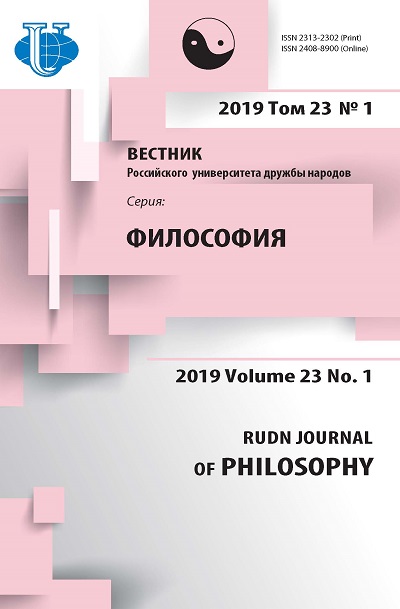FREEDOM, LOW AND IMAGINATION THE LECTURES OF F.W.J. SCHELLING IN 1800-1810s
- Authors: Rezvykh PV1
-
Affiliations:
- National Research University “Higher School of Economics”
- Issue: Vol 23, No 1 (2019)
- Pages: 7-18
- Section: HISTORY OF PHILOSOPHY: WEST-RUSSIA-EAST
- URL: https://journals.rudn.ru/philosophy/article/view/20945
- DOI: https://doi.org/10.22363/2313-2302-2019-23-1-7-18
- ID: 20945
Cite item
Full Text
Abstract
The gives the detailed analysis of the ratio of freedom and imagination in an unpublished manuscript written by F.V.Y. Schelling, which contains the materials for the lecture course read at Erlangen University in 1820-1821. The author focuses on the question of imagination as a condition for the possibility to unfold the modal differences that provide the hierarchy of predicative definitions. The article shows that both the draft philosophy of mythology and the philosophy of revelation are a direct continuation of the transcendentalist program given by Kant.Those projects bases on the thesis that the consciousness of freedom and consciousness of the law, justified in the “Critique of Practical Reason”, are related one another. Schelling following Kant’s theory, points to the law and to the unconditional imperative of freedom as the main principle which is not only theoretical or practical, but determines the separation of ontological and deontological modalities. At the same time, the formal structure of an imperative as a command has the specific character of “hiden opening”: what is themed in an imperative is not opened as a meaningful opportunity, it is only opened as theopportunity in its difference from necessity. I show in this article that interpreting the Schelling possibility relies on the teachings of I. Kant in his transcendental idealconception, connected with Kant's interpretation of the imagination’s productive ability. In the middle of Schelling’s theological interpretation of Kant's consciousness of lawdoctrine as the “fact of mind” lies the analogy between peacemaking and the ancestral sin of the first people. This concept is the main source of the theory of potency as ontological modalities, developed by Schelling in the 1830s - 1840s in lectures on the philosophy of mythology and the philosophy of revelation.
Keywords
About the authors
P V Rezvykh
National Research University “Higher School of Economics”
Author for correspondence.
Email: prezvykh@hse.ru
-
Petrovka str., 12, Moscow, Russia, 107031References
- Schelling FWJ. Initia philosophiae universae. Erlanger Vorlesung WS 1820/21. Hg. v. H. Fuhrmans. Bonn: Bouvier; 1969. (In German).
- Durner M. Wissen und Geschichte bei Schelling. Eine Interpretation der ersten Erlanger Vorlesung. München; 1979. (In German).
- Schelling FWJ. Erlanger Vorträge. In: Archiv der Berlin-Brandenburgischen Akademie der Wissenschaften. NL Schelling 103. (In German).
- Rezvykh PV. The Earlier Schelling and Kant: The search for the unconditional. Istorikofilosofskii ezhegodnik [History of Philosophy Yearbook]. 2004:250—278. (In Russ).
- Rezvykh PV. Freedom and Predication in the Work of F.W.J. Schelling in 1800—1810s. RUDN Journal of Philosophy. 2013;(1):6—18. (In Russ).
- Rezvykh PV. Absolyutnoe utverzhdenie i usloviya smysla: logiko-ontologicheskie paradoksy „filosofii tozhdestva“ F.V.I. Shellinga. In: Kul'tura i forma: k 60-letiyu A.L. Dobrokhotova. Moscow: HSE; 2010. p. 94—128. (In Russ).
- Schelling F.W.J. Die Weltalter. Fragmente. München. 1946. (In German).
- Schelling FWJ. Philosophical Letters on Dogmatism and Criticism. In: Schelling FWJ. Writings. Vol. 1. Moscow; 1987. (In Russ).
- Benz E. Schellings theologische Geistesahnen. Wiesbaden; 1955. (In German).
- Kant I. Conjectural Beginning of Human History. In: Kant I. Writings. Vol. 8. Moscow; 1994. p. 72 — 88. (In Russ).
- Hutter A. Geschichtliche Vernunft: die Weiterführung der Kantischen Vernunftkritik in der Spätphilosophie Schellings. Frankfurt am Main; 1996. (In German).
- Gabriel M. Der Mensch im Mythos: Untersuchungen über Ontotheologie, Anthropologie und Selbstbewußtseinsgeschichte in Schellings “Philosophie der Mythologie”. Berlin — New York; 2006. (In German).
- Frank M. Der unendliche Mangel an Sein. Schellings Hegelkritik und die Anfänge der Marxschen Dialektik, Frankfurt am Main; 1975. (In German).
- Schmidinger HM. Nachidealistische Philosophie und christliches Denken. Zur Frage nach der Denkbarkeit des Unvordenklichen, Freiburg am Breisgau; 1985. (In German).
- Düsing K. Vernunfteinheit und unvordenkliches Daßsein. Konzeptionen der Überwindung negativer Theologie bei Schelling und Hegel. In: K. Gloy/ D. Schmidig (Hg.), Einheitskonzepte in der idealistischen und in der gegenwärtigen Philosophie. Ergebnisse eines Symposiums (Luzern 1986), Bern/Berlin/Bruxelles; 1987. S. 109—136. (In German).
Supplementary files















